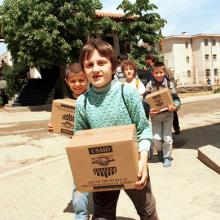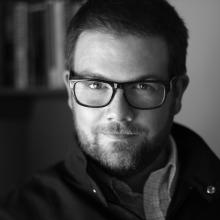USAID
The tragedy caused by the recent 7.8-magnitude earthquake will increase as time wears on: the death toll now exceeds 7,500; injuries and damage are widespread; and some 8 million people need humanitarian aid. The Nepalese government reports that up to 90 percent of health facilities are partially damaged in the worst hit areas, and one of the largest private hospitals in the capital city of Kathmandu is inoperable. Some 1.7 million children are in need of food assistance. This crisis is only going to get worse.
In comes foreign aid.
There might be big changes coming to the United States food aid program this year, and it could save millions of lives.
U.S. food aid, which began in the 1950s, spends an average of $2 billion a year* and has done much to prevent hunger and starvation across the globe. However, it has also been criticized for being inefficient, wasteful, and even self-serving.
Currently, up to 75 percent of the money we spend on food aid has to be used to pay for purchasing food from American farmers and shipping them overseas. This food saves lives, yes, but up to 16 percent of the money is spent on shipping. To make matters worse, American commodity crops are often significantly more expensive than food bought elsewhere.
Without such high requirements for American commodities, more money could go to buying food and saving lives. In fact, the United States is the only donor country to mandate by law that a certain amount of its donations must support its own economy.
Adam Nicholas Phillips: Chris, tell us a little bit about yourself.
Christopher LaTondresse: As the son of American evangelical missionary parents, I spent several formative years living in the former Soviet Union — Novosibirsk, Russia to be exact — smack dab in the middle of Siberia. My family is originally from Minnesota, so I was convinced that they were trying to find the one place on the planet colder than our home state to do missions work.
Growing up as a missionary kid, my parents taught me to take my faith seriously, to take Jesus seriously, no matter what the cost. Their example — leaving the trappings of an American middle-class lifestyle behind to pursue something they believed in — sticks with me to this day. The major lesson: There are things in this life worth making exceptional sacrifices for, especially things close to the heart of God.
I guess this is really what informs who I am, and animates my work today. True, I’m not a full-time missionary, but I’ve tried to devote my life to playing a role, however small, in what God is doing in the world. For my parents this was about planting churches and, to use the language of the Navigators (the missions organization that sent them) “making disciples”. For me it’s about taking Jesus seriously when he said, “What you do unto the least of least, you do for me.”
The Symposium on Global Agriculture and Food Security, Advancing Food and Nutrition Security at the 2012 G8 Summit, is set to begin soon with the following leaders in attendance:
- President Barack Obama
- Dr. Yayi Boni, President of the Republic of Benin & Chairperson of the African Union
- Meles Zenawi, Prime Minister of Ethiopia
- John Evans Atta Mills, President of Ghana
- His Excellency Jakaya Kikwete, President of the United Republic of Tanzania
- Hillary Rodham Clinton, Secretary, United States Department of State
- Rajiv Shah, Administrator, U.S. Agency for International Development
- Bono, Co-Founder of ONE and (RED)
- Ertharin Cousin, Executive Director, UN World Food Programme
- Dr. Kanayo F. Nwanze, President, International Fund for Agricultural Development
- Ms. Josette Sheeran, Vice Chairman, World Economic Forum
This week, the Senate will vote on H.R. 2354, an appropriation bill that will determine the amount of funds we allocate for poverty-related development assistance. There are a number of amendments proposed that will severely cut this aid, which currently helps millions of the world's poorest and most vulnerable. The bottom 1 percent, if you will.



